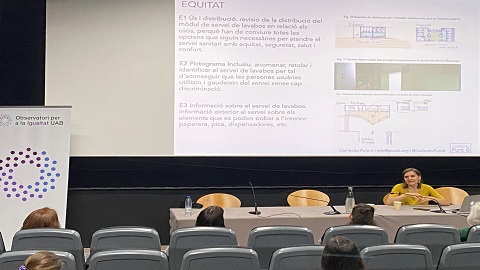The UAB studies how to make restrooms safer and more equal
The UAB, through the Observatory for Equality, is working on a model of restrooms that includes the identities and the different needs of everyone at the University, within the framework of the “UAB Diversa” (Diverse UAB) project. The report Review of the UAB rest room service with a gender perspective, which makes a preliminary diagnosis, has recently been presented.

The Review of the UAB rest room service with a gender perspective diagnosis was presented to the public on Thursday, May 19, in the Sala Cine of the UAB: to carry out this diagnosis, the Col·lectiu Punt 6 (Point 6 Group) has collected complaints and proposals from the students and Campus staff regarding the restrooms facilities and organised them following different criteria: equity, safety, health and comfort. The main complaints were the lack of nappy changing facilities, the lack of bins in some men’s restrooms, the queues, the maintenance provided in some restrooms, the perception of insecurity due to location and/or lighting, the lack of signs and space of some restrooms. Some people also asked for non-binary restrooms options and for pictograms to be changed to make them more inclusive.
Regarding pictograms, the results of a workshop done to propose an inclusive pictogram for restrooms were also presented. Some proposals shun the distinction between women and men, although some participants were comfortable with separate restrooms. Besides asking for the pictogram to identify the restrooms, it was also requested that there should be information about the elements in each rest room (waste bin, urinal, sink, etc.).
The conclusions and proposals that the Col·lectiu Punt 6 has developed to improve the UAB’s restrooms were also organised with the same criteria of equity, safety, health and comfort.
As for equity criteria, a review is to be carried out of the distribution of the restrooms service module in relation to uses, the introduction of inclusive pictograms is to be promoted and information on the services that can be found in each toilet is also to be provided. The aim is also to remove elements that may cause discrimination on grounds of sexual identity (such as the lack of bins in the men's toilets) and to ensure the availability of restrooms for people with functional, hearing or visual disabilities, people with incontinence, etc.
The safety criterion proposals referred to conditioning a good visibility and location of restrooms to generate trust and a perception of safety, promoting the use of the restrooms without discrimination, maintaining elements that provide safety and paying attention to the dynamics that generate discrimination and violence (it is recommended that these dynamics be monitored by the Observatory for Equality).
The health criterion focused on issues related to privacy for changing and cleaning menstrual cups (equipping cubicles with sinks) and with adequate and frequent restroom maintenance, especially those with more traffic such as those in Plaça Cívica or the portable restrooms at the UAB’s Festa Major. Healthier equipment such as litter bins "that work without the need to get our hands dirty", proper ventilation and dispensers for sanitary towels, tampons and condoms were also requested.
Lastly, regarding the comfort criterion, the proposals focused on the existence of spaces to attend to care workers and provide opportunities for caregivers, correcting the very limited space that some cubicles and toilets have to fulfil the needs of diverse bodies, and adding accessories that ease the use of the toilets, such as toilet paper and soap dispensers, bins, hangers, etc.
The “UAB Diversa” Project
This diagnosis has been developed within the framework of the “UAB Diversa” project, promoted and coordinated by the UAB Observatory for Equality.
The project arose in October of 2019, following a demand from the Physical Activity Service (SAF) about how to make changing rooms inclusive for people who have a non-normative gender identity or expression.
Later on, in 2020, efforts were made to unify the actions being taken in some faculties around campus restrooms to make them more inclusive and safer by adding gender-neutral restrooms. A pilot test was carried out in the restrooms of the Faculty of Arts and Humanities, where a pictogram was placed in some of them, and architectural modifications were made (removal of the urinals) to adapt them.